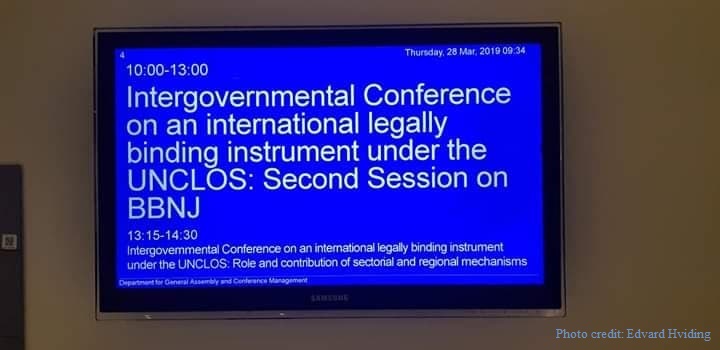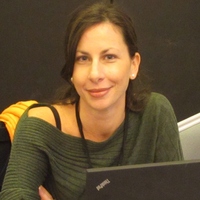
In this post, anthropologist Jennifer Telesca takes a deep-dive into the intricacies of the United Nations as a field research site, and how high-level global negotiations over the world’s High Seas and their resources can be understood through an anthropological lens.
![]()
First in 1958, then in 1982, the United Nations Convention on the Law of the Sea (UNCLOS) has defined the rights and responsibilities of nation states navigating through and exploiting the ocean as “resource.” Iterations of this treaty reflect the changing tides in what member states deem relevant to govern. More recently, since 2006, a series of meetings have prepared the ground for global cooperation about the high seas explicitly—defined as half the surface of the planet and two thirds of the world’s ocean outside the 200 nautical mile limit of an Exclusive Economic Zone (EEZ). A decade of discussions has led, in September 2018, to the commencement of formal negotiations about how to govern this massive space in the face of conflicting interests. Even so, governments in a series of intergovernmental conferences at UN headquarters in New York have pledged their commitment to formalize rules about the high seas through a new treaty under the UNCLOS framework aimed, in name, to safeguard biodiversity in areas beyond national jurisdiction (BBNJ). I have observed the BBNJ process as a delegate of the Intergovernmental Oceanographic Commission (IOC) of the United Nations Educational, Scientific and Cultural Organization (UNESCO) since April 2018.
Fishing, shipping, mining, and pharmaceutical and cosmetic manufacturing by way of the high seas are just some activities poised for international regulation under the new BBNJ instrument. Some advocates have called BBNJ the Paris Agreement for the ocean, so important is it to mitigate the rapid decline in a sea critical to the future of all beings on Earth. A report by the Intergovernmental Science-Policy Platform on Biodiversity and Ecosystem Services (IPBES) released in May 2019 only intensifies the political pressure on member states to act. Over a million species face total annihilation as the planet faces its sixth mass extinction ever in its four and a half billion year history—this the only one originating in the industry of a people.
![]()
What can anthropology contribute to an understanding of these enormously consequential negotiations?
Gone are the days when anthropologists hunkered down in a remote village in some faraway land to document through extended participant observation the lives of “others.” Like any community, the one formed by participants in the UN system has its own culture. Fieldwork situations in what we might call UN “villages”—treaty bodies, diplomatic missions, and other sites scaled supranationally—illuminate the conditions by which global elites decide how to regulate their activity in the very halls of power where they produce these rules. A critical inquiry into ocean governance is premised on treating power not as a distant abstraction but as an authority experienced and legitimated in the everyday lives of, here, delegates participating in the BBNJ conference. By studying both the micro and the macro dynamics of power in which the BBNJ process is firmly embroiled, anthropology is well equipped to show how patterns in the traffic between natural and cultural worlds inform what, ultimately, becomes treaty text.

One way to access how global elites contend with and engender asymmetrical power relations is through the common word: text, narrative, rhetoric, translation. Language is a window into discerning through its very repetition broader patterns in society and the extent to which an international legal system—on its face voluntary and nonhierarchical—still produces a sense of inequity and unfair treatment. A focus on language (or discourse) adopted during negotiations is not simply a call to examine talk itself but the limitations on the way something is talked about. How delegates talk about the ocean is related to how they think about it and act with respect to it. What words, then, signify, track, evidence, affirm the commitments of a diplomatic community poised to maintain, or challenge, the status quo on the high seas?
![]()
Elsewhere I have written about the peculiar language of a fish “stock”. This verbiage widely adopted by experts in marine conservation, including the ones in the supranational institution I know, the International Commission for the Conservation of Atlantic Tunas, tells us something important about the politics of business as usual. A category common to policymakers and environmentalists alike, a fish “stock” illuminates how normalized it has become to treat a living being as an asset reduced by her population, as if purposed solely for extraction in consumptive economies. By contrast, a commercial fish in regulatory zones is not linguistically marked as a majestic creature integral to the biome all beings share, even though each one can be understood in this way.
![]()
Back at BBNJ, delegates carry on the work of ocean governance in a field dominated by the logic of economic growth. They continue to relate to fish as commodified “stocks” exchanged on the global market. Yet something else is going on. Open for debate at BBNJ meetings is whether fish are also “marine genetic resources” ripe for profiteering. This language signals broader shifts in a political economy ascendant today. Slicing and dicing information about any fish, like a mortgage-backed security in a secondary market or data mining for proprietary license at Google, herald the invention of novel capital forms. By transforming a fish into a genetically sequenced biological asset for her monetization, a select few players may accumulate biowealth still further in a society increasingly organized around derivative finance. From this perspective, BBNJ becomes a site where elites on the world stage transform the ocean into a propertied grid of mobile assets where, legally, they anticipate and (re)set the terms to compete for “commodity empires”. The extent to which member states in consultation with industry and civil society will codify, or resist, this worldview through the BBNJ treaty is something time—and anthropological inquiry—will tell.

Jennifer Telesca is an anthropologist and Assistant Professor at the Pratt Institute, and our OceanStates ‘anchor woman’ in New York. She has extensive research experience from global and regional treaty negotiations, including the international management of Bluefin Tuna in the Atlantic. Together with OceanStates project director Edvard Hviding, she follows the presently ongoing negotiations at the United Nations on a new legal instrument for marine biodiversity beyond national jurisdiction.